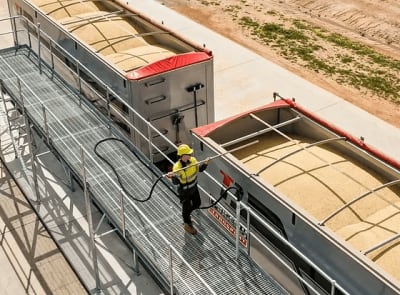Bendotti Exporters

With over 300 years of collective experience, their production is now over 10,000 tonnes annually, manufacturing a wide range of products under the Bendotti and WA Chip brands as well as Private Labels.
This case study was originally published in our report,
Funding the Future: Strategies to secure funding for Australian agribusinesses | Download the full report >>
How government grant funding is helping grow Bendotti Exporters
In just under 100 years, the Bendotti family has transformed from newly-arrived Italian immigrants growing potatoes on a few hectares of land near Pemberton in WA’s Great Southern region, to become a major processor of frozen chips, wedges, potato scallops and French fries.
Bendotti Exporters has had its own potato processing facility just north of Pemberton at Manjimup since 2002 where nearly 10,000 tonnes of locally-grown WA potatoes are processed annually for its own Bendotti and WA Chip brands as well as supermarket private labels.
Now the family-owned group, headed by Director Stephen Bendotti, is looking to increase its processing capacity and move into wider Australian distribution of its low-fat French fries, as well as make its processing plant more energy and water efficient.
Its expansion plans, up until now largely funded internally or by bank debt, have been boosted by a $1.78m grant to the company from the WA government in January 2024, under its Native Forest Transition Plan and associated New Industry Development Grants (NIDG) funding program.
Bendotti’s operations are based in the south-west corner of WA where the timber industry has been a long-term major employer. But the recent halt to commercial native forest logging by the state government has led to a severe loss of timber harvesting jobs, local family income and community upheaval, especially in traditional timber industry towns such as Manjimup, Pemberton, Northcliffe, Nannup and Albany.
The WA government’s $80m Native Forest Transition Plan is intended to help existing and new businesses in this region - especially in the food and tourism sectors - grow and develop further, supporting new economic activity in local communities and offering alternative employment opportunities.
Bendotti Exporters, which currently employs 39 local staff, was one of the major recipients of the government’s most recent round of grant funding. The funds will be used to buy new automated processing equipment, including robotic case packing, energy efficient ovens, and new storage technology, replacing ageing equipment and allowing the plant’s employees to be trained in advanced food manufacturing technologies.
Assisted in its grant application by RSM’s National Grants Manager, Dr Rebecca Barnes and Senior Analyst Dr Stephanie Guiney, the $1.78m grant will allow Bendotti Exporters to buy 3500 tonnes of additional potatoes from local Manjimup regional growers, increase its processing capacity by 36% and, with extra storage capabilities, move the plant into full production capacity for the first time, operating 24 hours a day for five days of every week of the year.
The upgrades and expansion to the plant, as well as energy and water efficiency measures, will see Bendotti Exporters return an extra $1.75m to local potato growers in new sales, allowing an extra 56 hectares of potatoes to be sown and harvested as well as boost Bendotti Exporters’ own revenue by more than $5m.
Stable employment will be created at the Manjimup potato processing plant for 12 extra local workers, with Bendotti saying these would most likely be displaced forestry workers who can now remain working and living in the local community with their families.
Economic impact analysis showed the successful $1.78m grant application by Bendotti Exporters will also indirectly create another 22 full time jobs across WA’s food supply chain and contribute $19.5m to Gross State Product in additional economic activity.




